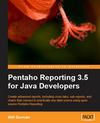Pentaho Metadata and its Editor
This week I split Pentaho Metadata and its Editor into two separate projects. Before this split, we built a single metadata jar file that contained both UI code and core library code. With this split, we now have a separate jar for the core library, which will be deployed to the Pentaho BI Server and other dependent projects. The original jar file was close to 1.5MB, now the library only jar is around 374K.
This split also resolves a circular project dependency that was created when we separated out the Metadata Query Language (MQL) Editor. In order to properly build Pentaho Metadata, one would have to first build the main project, deploy the jar to the MQL Editor, and then check in the new MQL Editor jar back into the main Metadata project and build again. Now we no longer have this circular dependency. First the core library is built, followed by the MQL Editor, and then finally the Metadata Editor is built.
You can access the latest Pentaho Metadata Library, Pentaho Metadata Editor, and Pentaho MQL Editor via SVN following these three links:
svn://source.pentaho.org/svnroot/pentaho-metadata/trunk
svn://source.pentaho.org/svnroot/pentaho-commons/trunk/pentaho-mql-editor
svn://source.pentaho.org/svnroot/pentaho-metadata-editor/trunk
Enjoy!
Will
 Comments(0)
Comments(0)